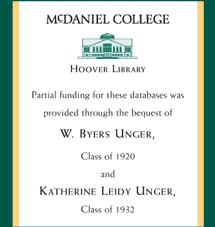The ideas that you have about a text are not considered in isolation but are a part of an ongoing conversation that began when the work was first published. When you work with a text you are building on the interpretations of others and attempting to contribute to that conversation.
Choosing the right resources for any research project is nearly half the battle. When you begin scholarly research in your discipline, knowing which resources to use, when and how to most effectively use them will assist you in entering into that ongoing, scholarly conversation.
If you would like to learn more about how to begin thinking about literary theory and criticism, click the questions below to continue reading.
The first thing you might consider when beginning a research project is to ask yourself a number of questions:
When using the library’s databases, take advantage of the built-in tools available to help you narrow or expand your search. Use database supplied subject terms, date limiters, and other options as a way to eliminate items that will not be useful to you.
Try alternative terms for searching. Sometimes you have to be creative about how you frame a search. It’s also helpful to keep a log of the search terms you have used and how effective or ineffective they were.
Follow the citation trail and use the bibliographies and works cited of articles you find to guide you to other resources related to your topic. It also gives you an indication of the other strands in the scholarly conversation.
Remember to cite where you found information, and if you plan ahead, request items through Interlibrary Loan if the Library does not own them.
Finally, if you are stuck and can’t find information ask a librarian or talk to your professor!

These databases are made possible through the generous contribution of W. Byers Unger and Katherine Leidy Unger.
McDaniel College
2 College Hill, Westminster, MD 21157
Phone 410.857.2281


